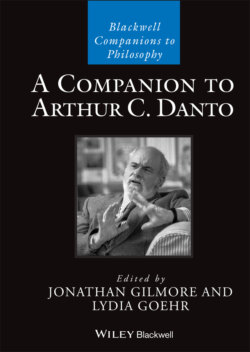Читать книгу A Companion to Arthur C. Danto - Группа авторов - Страница 50
4 The First-Person Point of View and Embodiment
ОглавлениеDanto conceives an agent’s own body as that through which it performs basic actions; it is what falls within its direct intentional control when it performs actions just like that, at will. The agent can exert intentional control over other things in the world, too, by performing non-basic actions, but then its intentional control is merely indirect, a matter of producing causal effects in the world via the more direct form of intentional control that it has over its own body. Since basic actions are performed from a first-person point of view, the body, as Danto defines it is very much owned – it belongs to me, the agent who possesses it, as my body. This is of a piece with Danto’s point that to be an agent, and to possess a body, goes together with recognizing a basic metaphysical duality between the me and the not-me.
Recall that Danto raises a problem of other bodies, which he compares to, but also distinguishes from, the problem of other minds. Both problems are alleged to arise because we must conceive others in terms of what we can know only from our own first-person points of view. In the case of consciousness, the thought is that there is something it is like to be aware of my own feelings, experiences, etc., and I can never directly confirm that there is something it is like for others too – for all I know, they are mere zombies for whom there is nothing it is like at all. The parallel problem about other bodies would be that I know from my own case what it is to have a body in Danto’s sense, of possessing a repertoire of basic actions, but I can never directly confirm that others possess a body in this sense – for all I know, their movements are mere events and not actions at all.
The normative orientation that Levi, Bilgrami, and I all share does not give rise to any parallel problem about other agents. It does recognize a sharp distinction between the first-person point of view from which agents deliberate and act, vs. the third-person point of view of observation and prediction. But the former is not a point of view that generates so-called privacy. Agents’ capacity to conceive others as agents as being like themselves, in the respect of possessing the first-person point of view of agency, goes hand in hand with a social capacity to engage other agents from within the space of reasons in distinctively interpersonal ways, such as argument, conversation, criticism, etc. Agents cannot consistently engage others in these ways while raising a doubt about whether others are agents in the normative sense.
But if a normative orientation in the philosophy of action does not raise a problem in the region of Danto’s problem of other bodies, then, presumably, it does not accommodate the conception of the body that is supposed to rise to the problem; but in that case, it presumably does not accommodate the distinction between basic and non-basic actions either. This is a point to which I will return.
